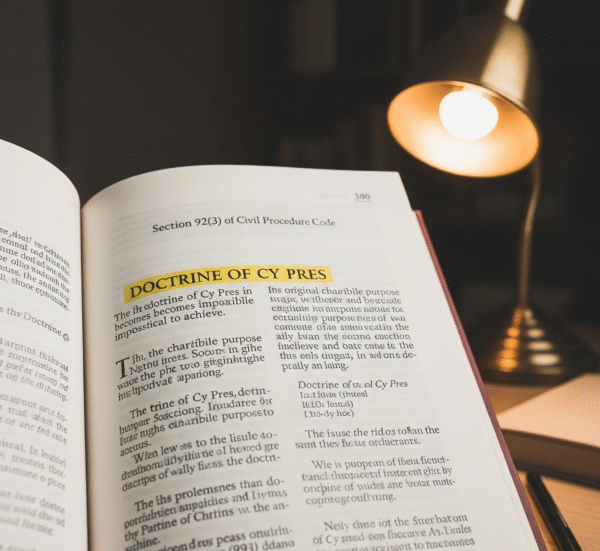Explore the doctrine of cy pres under Section 92(3) of the Civil Procedure Code, its significance in charitable trusts, and key Supreme Court judgments shaping its application in India.
Introduction
Derived from the Norman French phrase “cy pres comme possible,” which means “as near as possible,” the doctrine of cy pres allows courts to adapt the terms of a charitable trust when fulfilling its initial purpose becomes impractical or unworkable. This doctrine ensures that the charitable intent behind a trust continues to be honored, allowing the trust’s property or income to be used in a way closely aligned with the settlor’s wishes.
What Is the Doctrine of Cy Pres?
The cy pres doctrine aims to preserve a trust’s charitable objectives by allowing modifications when the original terms cannot be carried out. This prevents trusts from failing or their assets from becoming dormant, ensuring that they remain beneficial to society.
Section 92(3) of the Civil Procedure Code: Key Provisions
“Section 92(3) empowers courts to alter the original objectives of a charitable or religious trust in situations such as the following
- When the original purposes are fully or partly fulfilled, or cannot be executed as intended.
- When only a part of the trust property is used for the original purpose, leaving excess funds.
- When the trust property can be better used by combining it with other charitable resources.
- When the geographic or administrative scope of the trust is no longer applicable.
- When the original objectives have become outdated, detrimental, or no longer qualify as charitable under the law.
This legal provision helps apply the trust property “as near as possible” to the original charitable goals while adapting to contemporary needs.
How Does the Doctrine Work?
When courts apply cy pres, they focus on the settlor’s general charitable intention rather than rigidly following the exact terms. If the specified purpose or mode of application is impossible, courts redirect the trust’s resources to a purpose that closely matches the original intent, maintaining fidelity to the donor’s spirit and maximizing public benefit.
Landmark Judgments on Cy Pres
Ratilal v. State of Bombay (1954)
The Supreme Court emphasized that courts must execute charitable trusts as near as possible to the settlor’s general charitable intention if the original purpose fails.
N.S. Rajabathar Mudaliar v. M.S. Vadivelu Mudaliar (1970)
The Court upheld the doctrine by allowing redirection of trust funds when original purposes are impractical.
Abid Hatim Merchant v. Janab Salebhai Saheb Shaifuddin (2000)
This ruling clarified that courts may disregard a donor’s specific mode of application if impossible, but must uphold the broader charitable intention.
Why Is the Doctrine Important?
The doctrine of cy pres ensures that charitable trusts remain effective over time despite changing conditions. By allowing trusts to adapt while respecting the donor’s original wishes, it preserves the social and public benefit that these trusts are meant to provide.
Conclusion
The doctrine of cy pres under Section 92(3) of the Civil Procedure Code is a crucial mechanism that safeguards the continuity and relevance of charitable trusts. By enabling courts to adjust trust purposes in line with present-day circumstances, it ensures that the settlor’s charitable intent continues to benefit society effectively.

























